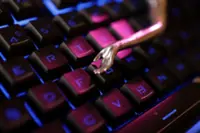MOSCOW: Russia's government has pushed the country into an economic crisis by not tackling its financial problems fast enough, former finance minister Alexei Kudrin said on Monday, as evidence mounted of trouble spreading through the economy.
The central bank bailed out its first victim of the collapsing currency, authorities announced a tax on grain exports to protect domestic stocks and a Reuters poll of 11 economists predicted that Russia's gross domestic product would fall 3.6 percent next year.
Russia has been hit by what Economy Minister Alexei Ulyukayev recently called a "perfect storm" of plummeting oil prices, sanctions related to its military action in Ukraine, and a flight of investors' capital -- made worse by a lack of structural reforms that means the economy is overwhelmingly dependent on oil revenues.
Kudrin, one of few to criticise President Vladimir Putin, said he believed the decline in the rouble could be attributed primarily to the sanctions, imposed following Russia's annexation of Ukraine's Crimea region and its subsequent support for loyalist fighters in the east.
Putin discussed the Ukraine crisis with the leaders of Germany, France and Ukraine by telephone on Monday, the Kremlin said, noting that a ceasefire had largely held in eastern Ukraine in recent days.
It said the leaders had emphasised the importance of removing heavy weapons and exchanging prisoners, but gave no indication of whether a breakthrough had been reached.
Government officials have tried to minimise the impact of sanctions on the country and its rouble currency, which plunged 80 percent against the dollar last week despite a hike in interest rates to 17 percent. Putin has claimed "external factors" like oil were the key culprit behind the country's "tough times".
Kudrin -- a darling of investors who is credited with building Russia's $170 billion sovereign wealth funds -- warned that Russia risked having its debt downgraded to junk status in 2015.
"Today, I can say that we have entered or are entering a real, full-fledged economic crisis. Next year we will feel it clearly," the former minister told a news conference.
"The government has not been quick enough to address the situation ... I am yet to hear ... its clear assessment of the current situation."
Kudrin quit in 2011 in protest at proposals to increase defence spending, although he and Putin are still believed to be close.
MOUNTING PROBLEMS
Mounting evidence suggested that Russia's economic pain and isolation were starting to bite.
The country announced plans to impose a heavy tax on grain exports since rouble volatility and high global prices have caused exports to spike: Russian news agencies reported Prime Minister Dmitry Medvedev told a meeting with officials that the country needed to hang on to its stocks.
And Russia's central bank said it would have to bail out mid-sized Trust Bank with 30 billion roubles (347 million pounds) to stop it going bankrupt. Trust held 145 billion roubles ($2.63 billion) in private personal deposits as of Dec. 1, according to its accounts
The country's largest lender Sberbank
Though Russia's biggest oil firm Rosneft partially eased some worries by saying it had made a $7 billion debt repayment from its own cash reserves -- investors had been concerned it could default because the sanctions cut off its access to Western finance -- it announced separately that a deal to acquire an oil trading business from Morgan Stanley had been terminated due to a refusal by regulators in the United States to clear it.
The termination of the deal is another blow for Rosneft after its partners including ExxonMobil
Kudrin forecast a series of defaults among both medium and large companies -- though he said banks would probably be supported by the state -- which was likely to result in rating agencies downgrading Russia's debt to "junk" status.
Most agencies have put Russia this year one notch above junk status.
"Russia will get a downgrade," Kudrin said. "It will enter the 'junk' territory."
MISTRUST
The rouble firmed against the dollar
While the currency, down some 45 percent against the dollar so far this year
The central bank envisages next year's inflation at around 8 percent. Economists polled by Reuters see it at 9.2 percent.
Kudrin said he believed that between 25 and 35 percent of the decline in the rouble could be attributed to sanctions. The rest, he said, was down to a stronger dollar and investors' mistrust of Russian authorities and their actions.
His outlook for the economy next year was bleak: Even if the price of oil rose to $80 per barrel, gross domestic product was still likely to fall by more than 2 percent in 2015, Kudrin said. At $60 per barrel GDP would decline by 4 percent or more, he added, echoing the central bank's latest assessment, published last week.- Reuetrs





